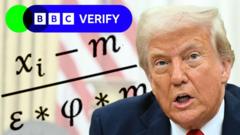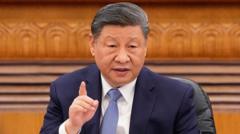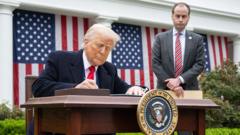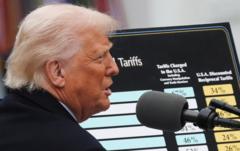The international community is wary of the potential economic fallout stemming from Donald Trump's newly imposed tariffs, with calls for countermeasures and negotiations intensifying.
**Global Outcry Over Trump's New Tariffs: Economic Tensions Rise**

**Global Outcry Over Trump's New Tariffs: Economic Tensions Rise**
World leaders and economic experts voice concerns over the sweeping tariffs announced by the U.S. president.
In a move that has sparked international outcry, U.S. President Donald Trump announced a universal 10% tariff on all goods entering the United States, effective April 5. European Commission President Ursula von der Leyen termed this decision a "major blow to the world economy," predicting significant repercussions for millions globally. Von der Leyen's remarks were echoed by global leaders, including those from China, who issued stern warnings of "resolute countermeasures" in response.
The tariffs reportedly aim to rectify what Trump deems unfair trade practices, with an emphasis on bolstering U.S. manufacturing. Trump contended that the measures would help "make America wealthy again." However, the European Commission warns that the new taxes are likely to escalate uncertainty in international markets, leading to dire consequences particularly for vulnerable nations that will face steep tariffs, with the EU facing a looming 20% escalation by April 9.
Countries like Italy and Spain are taking a cautious approach, with Italy's Giorgia Meloni acknowledging the decision as "wrong" yet advocating for negotiations with the U.S. to avert a trade war. French President Emmanuel Macron also criticized the tariffs, calling them a "brutal and unfounded decision" that would ultimately weaken both the U.S. economy and its consumers.
The impact extends beyond Europe, as China faces a staggering 34% tariff alongside an existing 20% levy, which brings total duties close to 54%. The Chinese Ministry of Commerce urged immediate cancellation of the tariffs, asserting that they would protect their "rights and interests." Taiwan and South Korea voiced their disappointment as well, with South Korea's acting President declaring that a global trade war had become a reality.
Other nations, including Japan and Australia, expressed similar concerns, with Japan describing its 24% levy as "extremely regrettable." Meanwhile, the UK is now preparing for potential retaliation, with Prime Minister Sir Keir Starmer promising to secure a trade deal with the U.S. while remaining level-headed in response to the tariffs.
Brazil is among the countries looking to counter Trump's tariffs with new domestic legislation aimed at ensuring reciprocity in trade. U.S. Treasury Secretary Scott Bessent cautioned against retaliatory measures, warning of the likelihood of escalation in economic tensions.
This sweeping tariff announcement raises critical questions about the future of global trade relations, as countries prioritize negotiations and counteractions in what could reshape the dynamics of international commerce.
The tariffs reportedly aim to rectify what Trump deems unfair trade practices, with an emphasis on bolstering U.S. manufacturing. Trump contended that the measures would help "make America wealthy again." However, the European Commission warns that the new taxes are likely to escalate uncertainty in international markets, leading to dire consequences particularly for vulnerable nations that will face steep tariffs, with the EU facing a looming 20% escalation by April 9.
Countries like Italy and Spain are taking a cautious approach, with Italy's Giorgia Meloni acknowledging the decision as "wrong" yet advocating for negotiations with the U.S. to avert a trade war. French President Emmanuel Macron also criticized the tariffs, calling them a "brutal and unfounded decision" that would ultimately weaken both the U.S. economy and its consumers.
The impact extends beyond Europe, as China faces a staggering 34% tariff alongside an existing 20% levy, which brings total duties close to 54%. The Chinese Ministry of Commerce urged immediate cancellation of the tariffs, asserting that they would protect their "rights and interests." Taiwan and South Korea voiced their disappointment as well, with South Korea's acting President declaring that a global trade war had become a reality.
Other nations, including Japan and Australia, expressed similar concerns, with Japan describing its 24% levy as "extremely regrettable." Meanwhile, the UK is now preparing for potential retaliation, with Prime Minister Sir Keir Starmer promising to secure a trade deal with the U.S. while remaining level-headed in response to the tariffs.
Brazil is among the countries looking to counter Trump's tariffs with new domestic legislation aimed at ensuring reciprocity in trade. U.S. Treasury Secretary Scott Bessent cautioned against retaliatory measures, warning of the likelihood of escalation in economic tensions.
This sweeping tariff announcement raises critical questions about the future of global trade relations, as countries prioritize negotiations and counteractions in what could reshape the dynamics of international commerce.





















